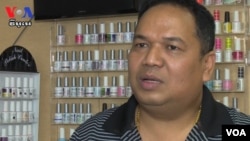This Cambodian-owned nail salon on the outskirts of Atlanta in Clayton County, GA, is almost full by noon on a Sunday.
Since early morning, workers are busy polishing and painting nails for their clients at tables and large chairs.
This is a popular job among Cambodians living in the US, a difference compared in Cambodia, where this sort of work is less popular.
Kong Chansokun has been running the business for nine years and has employed 15 staff.
Sitting at his desk in front of a collection of multi-colored nail products, he explained that many Cambodians who have migrated to the United States do not have the qualifications to be “a doctor or a lawyer or running a big business” and instead they have to do blue-collar work.
“There is no way [to earn a living] other than doing this nail salon job,” he said. “It does not mean that this job pays well and others don’t. The reality is that we don’t have higher knowledge and this job does not require much knowledge.”
Chansokun is among the new generation of Cambodian-Americans who have started their own small businesses instead of seeking employment with others.
Another small business owner, Vinny Chhay, has run an auto-shop since 2006. Chhay was a high school soccer player but decided not to pursue a career in sports after graduation.
“Should I work for others? No, I don’t want to work for others,” he said.
Tony Oum shared similar thoughts. He has owned a truck business for 12 years now.
“In Georgia, some Cambodians began to startup their own businesses,” Oum said. “In the past, many of them simply drove trucks for companies.”
Tony has had many jobs, from a job in a restaurant to driving a truck for an American shipping company, before saving up enough money to start his own business. He advises other Cambodians follow suit to take the chance.
“My belief is that if we work for others we can just survive from one pay check to another,” said Oum. “We are living a simple life like others, which means we have a car and enough meals, but we cannot be rich. If we want to be rich with a brighter future and get things as we want like big houses, we have to start a business.”
Tony earns between $2,000 to $3,000 a week from his business.
There are over 10,000 Cambodian-Americans living in Georgia and most of them live in Atlanta’s southern Riverdale city, in Clayton county.
Activist Nem Chhoeung is pleased with the apparent improvement in the lives of people in his community.
“If we look at the new generation, we see that their competency is much higher than the older one in both their English language skill and intelligence,” said Chhoeung, who is president of the Khmer Town Association. “Therefore, they are able to communicate well with customers. That’s why starting a simple business like nail salons and beauty supplies is not hard and does not require higher skills.”
Chhoeng’s next expectation is for the growth of a Cambodian Town that the community has recently set up.
“I hope that the Cambodian Town will raise our face further to show that the new generation doesn’t simply do simple jobs, but we are able to start our own businesses to pay tax to the government,” he said. “This is a crucial contribution that I want to see in our community.”
Another attraction in Riverdale city is a new Cambodian shopping center, located just 10 kilometers from Hartsfield-Jackson International Airport.
The center now has a few grocery, jewelry, beauty supply stores, and a restaurant owned by Cambodians. The owner, Vanh Xieng Lee, hopes that many more Cambodians will come to the center to make this a strong business in Riverdale.
A Cambodian-Laotian born in Stung Treng province of Cambodia, Lee has been selling grocery here for the past 30 years.
“A few friends of mine and me put our money together to buy this shopping center to make it the symbol of Cambodian Town,” Lee said. “Now is the time that Cambodians should move to Georgia and open shops like gift shops and restaurants like in Cambodia. They should know that the real estate prices here are still cheap and there are good business opportunities.”
Lee sees more room for business growth in Atlanta and offers his advice to newcomers.
“We still don’t have a barber’s shop, air-ticket agents, and an insurance agent,” he adds.
However, owning a business is not without challenges.
“Opening a shop is easy, but the hard part is finding people to work for us,” said Chansokun, the nail salon owner. “This is the main challenge.”
The Cambodian community in Georgia is relatively small compared to other prominent Cambodian communities, such as in Long Beach, CA, and Lowell, MA, even though there has been a sharp increase in the past decade.









